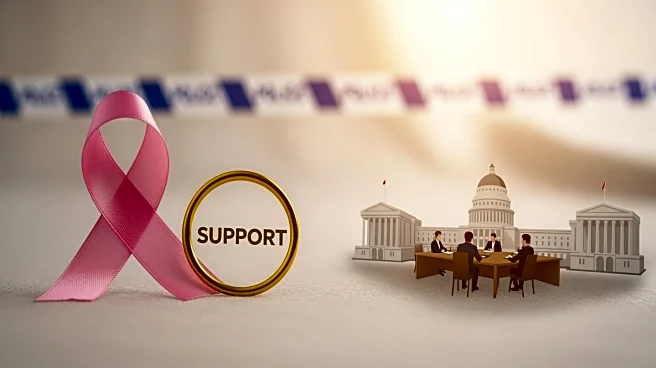What's Happening?
Christiane Amanpour, a prominent CNN news anchor, has revealed that she is managing ovarian cancer for the third time. Amanpour shared her diagnosis on the 'Changing the Ovarian Cancer Story' podcast, emphasizing the importance of listening to one's body
for early detection. She first announced her battle with ovarian cancer in 2021, which involved major surgery and 18 weeks of chemotherapy. Despite the challenges, Amanpour returned to her reporting duties within six months. Her current diagnosis is being well-managed, and she credits her recovery to the support from her community, including her son and colleagues. Amanpour's case is somewhat unique due to the early stage at which her cancer was detected, allowing for more effective management.
Why It's Important?
Amanpour's experience underscores the critical role of early detection and community support in managing cancer. Her public disclosure aims to raise awareness about ovarian cancer, which is often diagnosed at a late stage due to non-specific symptoms. This can lead to prolonged misdiagnosis, as noted by Dr. Angela George, an oncologist involved in Amanpour's treatment. The journalist's story highlights the broader issue of women's health and the need for increased awareness and research funding for ovarian cancer. Her advocacy may inspire others to seek timely medical advice and support, potentially improving outcomes for many women facing similar health challenges.
What's Next?
Amanpour's ongoing battle with cancer may lead to further public discussions about the importance of early detection and the challenges faced by women with ovarian cancer. Her continued advocacy could influence healthcare policies and funding priorities, encouraging more research into early detection methods and treatments. Additionally, her story may prompt media outlets to focus more on health-related issues, potentially leading to increased public awareness and support for cancer research initiatives.
Beyond the Headlines
Amanpour's situation also highlights the emotional and psychological aspects of battling cancer, emphasizing the importance of a strong support network. Her experience illustrates how personal and professional communities can play a vital role in a patient's recovery journey. This aspect of her story may encourage others to seek and offer support within their own networks, fostering a culture of empathy and assistance for those facing serious health challenges.

















